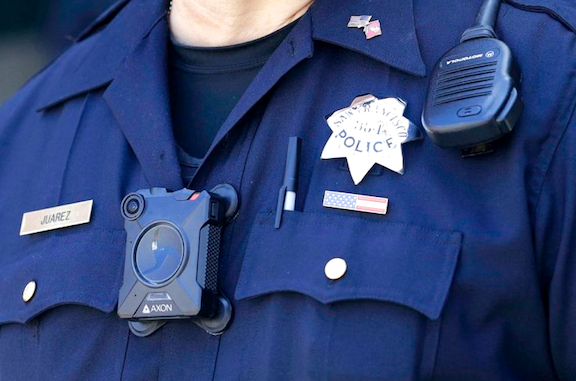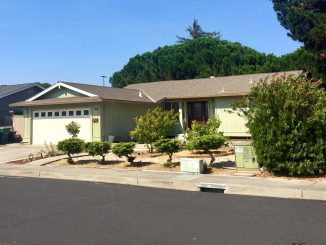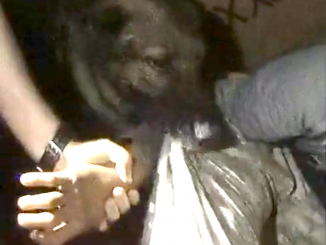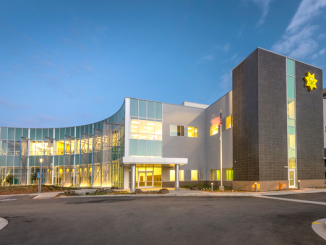
BY KYLE MARTIN
Daily Post Staff Writer
The Palo Alto Police Department is withholding body camera footage of a police dog attack of an innocent Mountain View man at his home, though state law requires the release of such a video. City Council is scheduled to discuss the attack for the first time in closed session tonight (March 15).
Two laws, Assembly Bill 748 and Senate Bill 1421, require police departments to release body-camera footage of any any incident of alleged officer misconduct or “use of force.”
The Post requested videos of the attack by a Palo Alto police dog on Mountain View resident Joel Domingo Alejo, who filed a $20 million legal claim against the cities of Palo Alto and Mountain View, their police departments and Palo Alto police officer DuJuan Green.
(Alejo’s initial claim against the city of Palo Alto and a later claim.)
The June 25 incident happened in Alejo’s backyard on Elsie Avenue in Mountain View, but Mountain View police borrowed a Palo Alto police dog.
The laws require the release of the video within 45 days of the incident.
But the Palo Alto Police Department’s records keeper, Lisa Scheff, said in a response to the Post’s request for the video that the department can withhold it because of an exception in the state open records law. However, the laws don’t say anything about such an exception.
It happened before
It’s not the first time Palo Alto police have tried to prevent the release of police body-cam video despite the passage of AB748 and SB1421.
The Post struggled for months last year to get the video of police Agent Thomas DeStefano violently arresting and injuring Julio Arevalo on July 10, 2019, outside Happy Donuts at 3916 El Camino Real in Palo Alto.
The Post first asked for the video on Jan. 10, 2020, but Scheff cited the same government code to halt the release of the footage a number of times until finally releasing the footage 161 days later.
Arevalo is suing the city for $10 million because the arrest by DeStefano left him with a broken bone in his eye socket and extensive hospital bills.
Police said the Alejo attack was a case of mistaken identity, and the Santa Clara County District Attorney’s office said it will not press charges against any of the officers involved in the dog attack.
The attack left cuts on Alejo’s leg, caused him “emotional distress, fear, terror, anxiety, humiliation, loss of sense of security, dignity and pride, punitive damages, extreme pain,” bleeding, bruising and more, according to Alejo’s claims.
Council urged to view the video
In a Feb. 21 letter to council, Palo Alto resident and retired public defender Aram James told council members he wants them to see the footage when they discuss the attack in closed session.
He also said the city should consider settling Alejo’s $20 million claim because it “may in fact be a reasonable settlement when compared with what a civil jury may reward after a jury trial.”
“If video footage, body-worn camera footage, is available, the council should watch (it) and consider how this potential evidence might impact a potential juror in the civil matter,” James wrote. “If no video footage is available you might want to ask the police chief and city attorney where the footage is.”
Correction: A earlier version of this story in the print edition of the Daily Post gave the wrong bill numbers. This version has been corrected.




This kind of behavior does not inspire confidence in our police department or in our city government: the ‘thin blue line’ is real, and presents an enormous obstacle to ensuring that Palo Alto police treat ALL citizens fairly, not just wealthy white residents. Refusing to disclose body camera footage in violation of state law would seem to provide good cause to fire the police department’s record keeper. Why are we tolerating her repeated failure to comply with state laws? If anyone ought to be held to account for violating the law, it should be an employee of our police department, whether an officer out on patrol or a record keeper sitting in an office at police department headquarters. This kind of despicable obstruction of justice is simply unacceptable.
BTW, I would suggest Mr. Martin take a closer look at the text of at least AB748 (have a look here: https://leginfo.legislature.ca.gov/faces/billTextClient.xhtml?bill_id=201720180AB748) , because it pretty clearly does include a provision that permits the withholding of audio or video recordings of an incident:
(4) Notwithstanding any other provision of this subdivision, commencing July 1, 2019, a video or audio recording that relates to a critical incident, as defined in subparagraph (C), may be withheld only as follows:
(A) (i) During an active criminal or administrative investigation, disclosure of a recording related to a critical incident may be delayed for no longer than 45 calendar days after the date the agency knew or reasonably should have known about the incident, if, based on the facts and circumstances depicted in the recording, disclosure would substantially interfere with the investigation, such as by endangering the safety of a witness or a confidential source. If an agency delays disclosure pursuant to this paragraph, the agency shall provide in writing to the requester the specific basis for the agency’s determination that disclosure would substantially interfere with the investigation and the estimated date for disclosure.
(ii) After 45 days from the date the agency knew or reasonably should have known about the incident, and up to one year from that date, the agency may continue to delay disclosure of a recording if the agency demonstrates that disclosure would substantially interfere with the investigation. After one year from the date the agency knew or reasonably should have known about the incident, the agency may continue to delay disclosure of a recording only if the agency demonstrates by clear and convincing evidence that disclosure would substantially interfere with the investigation. If an agency delays disclosure pursuant to this clause, the agency shall promptly provide in writing to the requester the specific basis for the agency’s determination that the interest in preventing interference with an active investigation outweighs the public interest in disclosure and provide the estimated date for the disclosure. The agency shall reassess withholding and notify the requester every 30 days. A recording withheld by the agency shall be disclosed promptly when the specific basis for withholding is resolved.